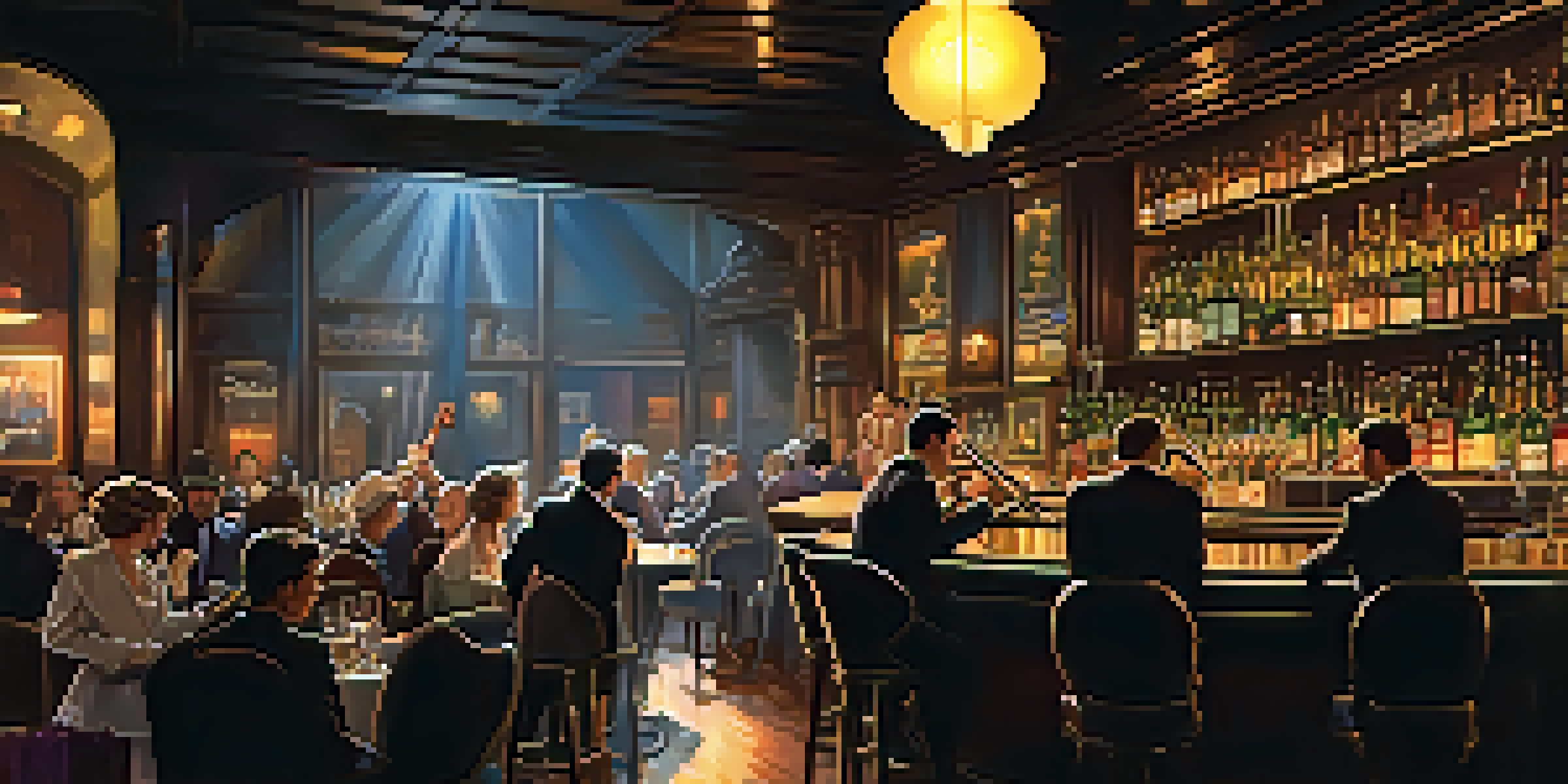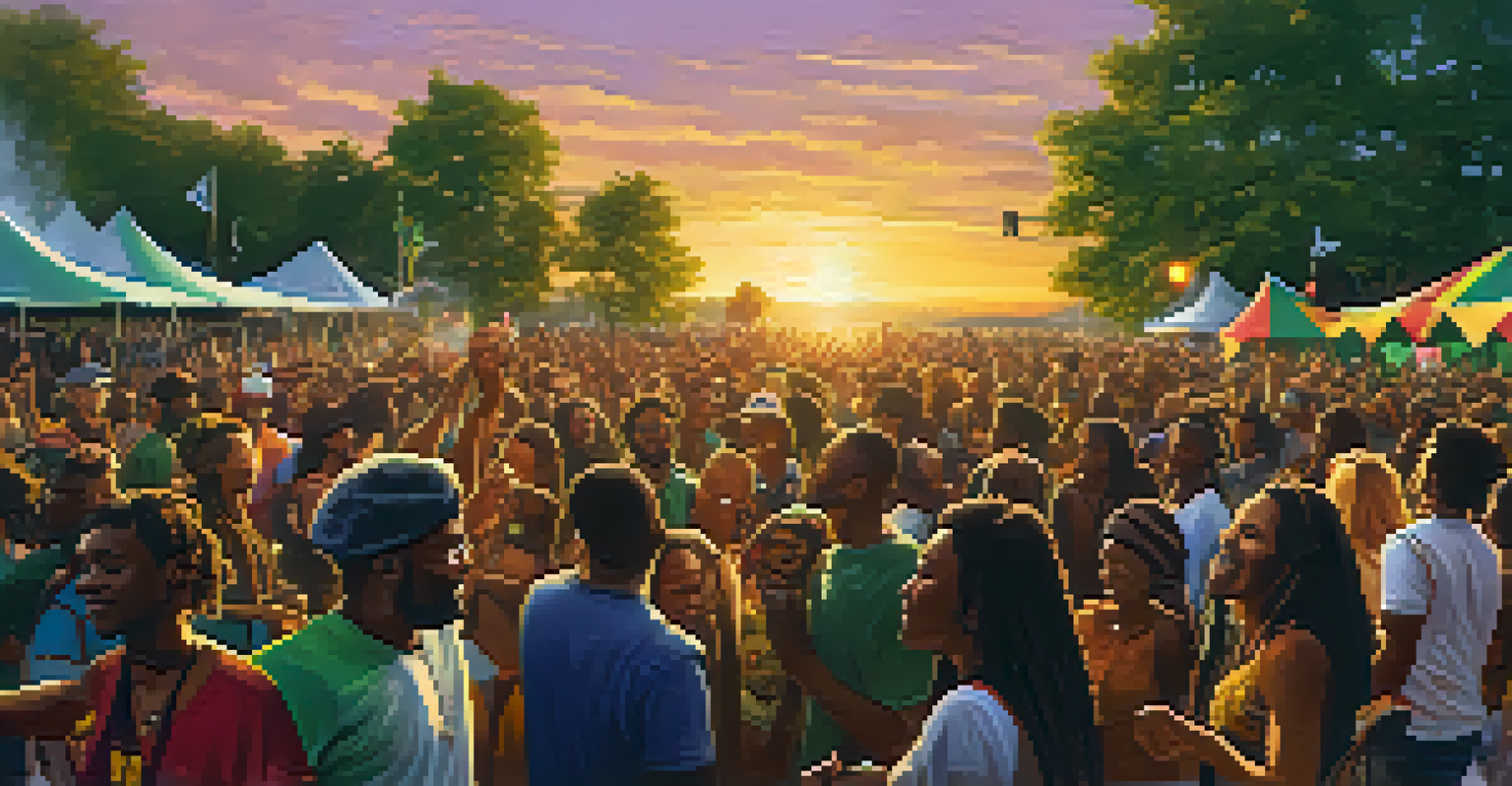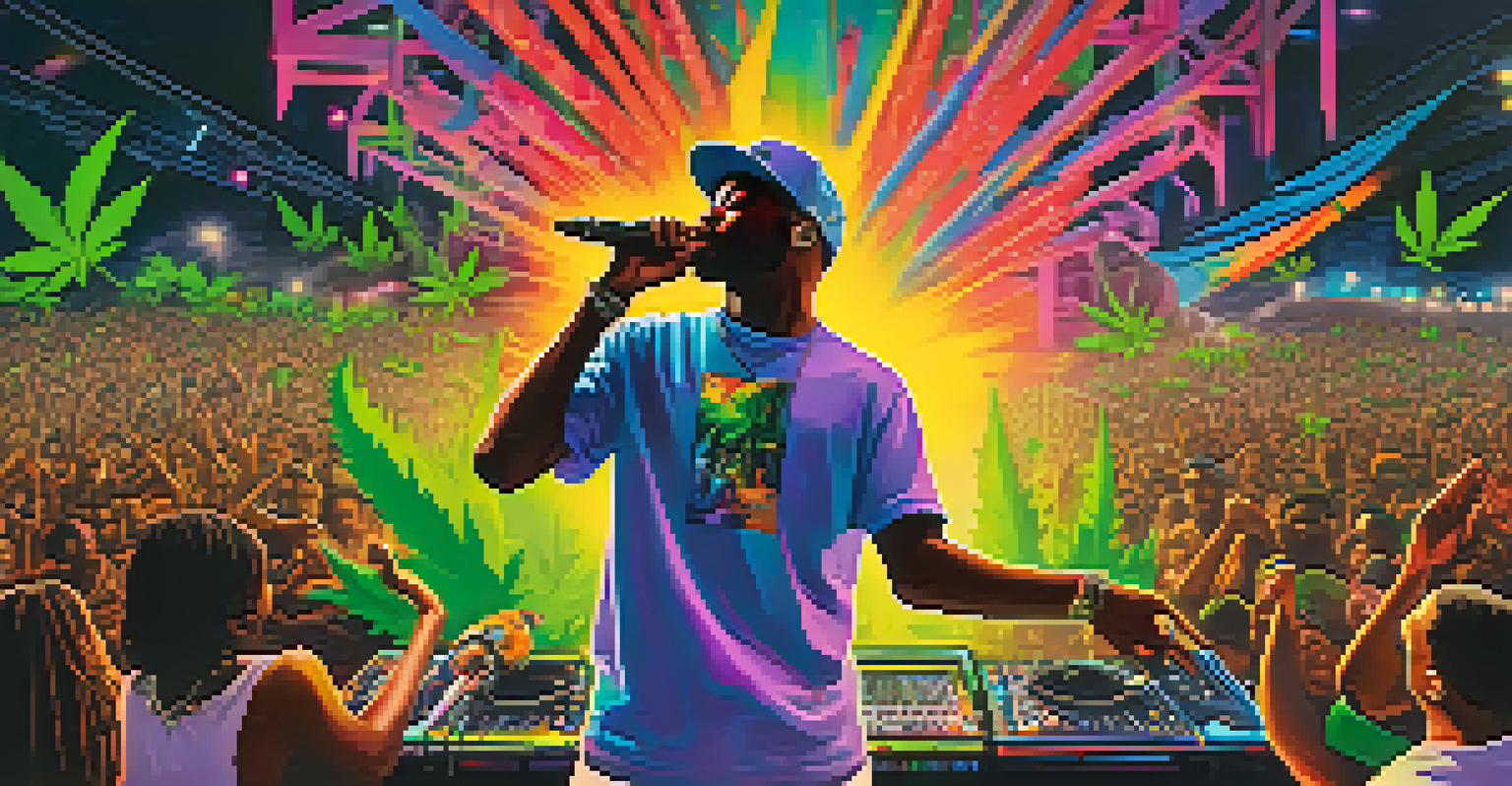Cannabis and Music: Cultural Expressions Across the Globe

The Historical Roots of Cannabis in Music
Cannabis has a long, intertwined history with music that dates back centuries. From ancient cultures using the plant in rituals, to its role in folk music, its influence is profound. Many musicians have drawn inspiration from the effects of cannabis, leading to creative breakthroughs and unique sounds.
When you take cannabis, you feel like you can express yourself better.
In the 20th century, the counterculture movements embraced cannabis as a symbol of rebellion. This period saw the rise of genres like jazz and rock, where artists openly experimented with the plant, often resulting in some of the most iconic music of the era. Artists like Louis Armstrong and Bob Marley famously incorporated cannabis into their creative processes.
Today, we see a resurgence of this relationship as new genres emerge, influenced by the cannabis culture. This historical connection not only shapes the music itself but also reflects the societal attitudes toward cannabis across different eras.
Cannabis and Jazz: A Perfect Pairing
Jazz and cannabis share a unique bond, with both evolving together in the vibrant cultural landscapes of the 20th century. Many jazz musicians, such as Duke Ellington and Miles Davis, were known to indulge in cannabis, believing it enhanced their creativity and improvisation skills. The spontaneous nature of jazz complements the altered states often associated with cannabis consumption.

The smoky jazz clubs of the 1940s and 50s became synonymous with the sound of improvisation and the sweet aroma of cannabis. These venues not only provided a space for musicians to perform but also to collaborate and experiment with their art, often under the influence of the plant. This synergy led to the creation of timeless pieces that still resonate today.
Cannabis Inspires Musical Creativity
Throughout history, cannabis has played a crucial role in the creative processes of various music genres, influencing iconic artists and their groundbreaking sounds.
Moreover, the improvisational aspect of jazz mirrors the unpredictable effects of cannabis, making it a fitting companion for both artists and listeners. As we delve deeper into this connection, it becomes clear that cannabis has played an integral role in shaping the jazz genre.
Reggae and the Rastafarian Influence
Reggae music is perhaps one of the most recognizable genres associated with cannabis culture, particularly through the Rastafarian movement. For Rastafarians, cannabis, or ganja, is considered a sacrament that enhances spiritual connection and is integral to their religious practices. This belief directly influences the themes found in reggae music, which often addresses social justice, love, and spirituality.
Music is the universal language of mankind. It transcends all boundaries and has the power to connect us, just as cannabis does.
Bob Marley, the most famous reggae artist, used his platform to promote the positive aspects of cannabis within the Rastafarian context. His songs often reflect a deep reverence for the plant and its role in promoting peace and unity. This cultural expression has helped shape reggae music into a global phenomenon, transcending geographical boundaries.
Today, reggae continues to celebrate cannabis, with many artists advocating for its legalization and acceptance. This relationship highlights how music can serve as a vehicle for cultural expression, facilitating dialogue around cannabis and its significance in various societies.
Hip-Hop: Cannabis as a Cultural Staple
Hip-hop culture has embraced cannabis, often featuring it as a recurring theme in lyrics, music videos, and lifestyle. The genre emerged in the 1970s and 80s, coinciding with changing perceptions of cannabis in urban communities. Artists like Snoop Dogg and Cypress Hill have made cannabis a staple of their public personas, celebrating its recreational and creative benefits.
The connection between cannabis and hip-hop goes beyond mere representation in lyrics; it reflects a broader cultural attitude that values authenticity and self-expression. This has led to a flourishing subculture where cannabis is not only consumed but celebrated in various forms, including cannabis-themed music festivals and events.
Jazz and Cannabis: A Historical Bond
The relationship between jazz music and cannabis has shaped the genre's improvisational nature, reflecting a unique cultural synergy in the 20th century.
Moreover, hip-hop has played a crucial role in shaping public perception around cannabis, contributing to the ongoing conversation about legalization and social justice. Through storytelling and personal narratives, hip-hop artists have highlighted the struggles faced by communities affected by cannabis prohibition, further intertwining the genre with the plant's cultural significance.
The Psychedelic Rock Movement and Cannabis
The psychedelic rock movement of the 1960s and 70s is another vivid example of how cannabis influenced music. Bands like The Grateful Dead and Jefferson Airplane embraced both cannabis and psychedelics to create immersive musical experiences that sought to expand consciousness. Their music often featured extended jams filled with surreal lyrics and experimental soundscapes.
Cannabis served as a catalyst for creativity and exploration during this era, with artists believing it enhanced their ability to connect with their audience on a deeper level. The use of cannabis in these musical circles often fostered a sense of community, where fans and musicians alike could share in the experience of transcending reality through sound.
As psychedelic rock continues to inspire new artists, cannabis remains a symbol of artistic freedom and exploration. This genre's lasting impact on music culture underscores the ongoing relationship between cannabis and the creative process.
Global Perspectives: Cannabis in Traditional Music
Across the globe, various cultures have integrated cannabis into their traditional music practices, often linking it to rituals and celebrations. In regions like India, cannabis is used during religious festivals, with musicians playing traditional instruments to accompany the festivities. The plant's calming effects are believed to enhance spiritual experiences and foster a sense of unity among participants.
Similarly, in parts of Africa, cannabis is often featured in ceremonial music, where it plays a role in connecting communities. The musical styles vary widely, but the underlying theme is the same: cannabis enhances the communal experience, allowing people to bond through shared cultural expressions.
Global Influence on Traditional Music
Cannabis has transcended geographical boundaries, enhancing traditional music practices worldwide and fostering a sense of community and cultural identity.
These global perspectives highlight how cannabis transcends geographical boundaries, influencing traditional music in ways that celebrate cultural heritage. The relationship between cannabis and music is not only about enjoyment; it's also about preserving and promoting cultural identity.
The Modern Cannabis Music Scene
In today's digital age, the cannabis music scene is thriving, with a growing number of festivals and events dedicated to celebrating both music and cannabis culture. Events like the Cannabis Cup and the High Times Festival attract artists and fans alike, creating a vibrant space for collaboration and creativity. These gatherings not only showcase music but also promote cannabis awareness and advocacy.
Moreover, with the rise of streaming platforms, musicians are finding new ways to connect with audiences interested in cannabis culture. Many artists are now openly discussing their cannabis use and its impact on their creative process, further normalizing its presence in the music industry. This openness fosters a community where fans can engage with artists on a more personal level.

As the cannabis landscape continues to evolve, so does its relationship with music. The modern scene reflects a dynamic interplay between creativity, culture, and advocacy, showcasing how music can inspire change and promote acceptance in society.